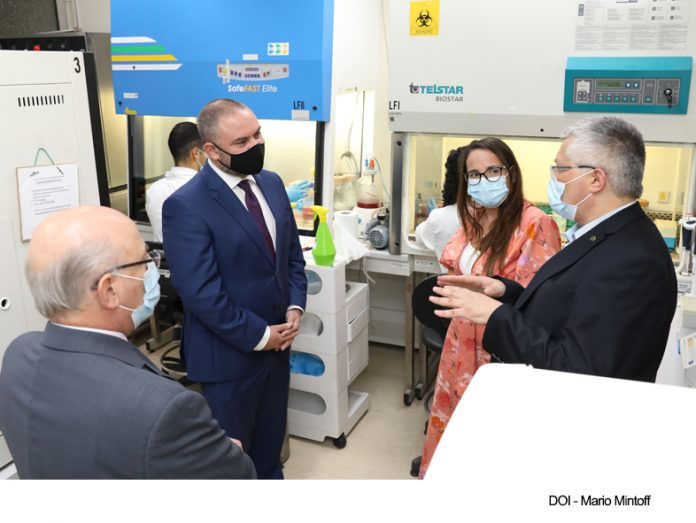A research project called LCeNT is being undertaken by researchers at the Department of Clinical Pharmacology and Therapeutics within the University of Malta, to study and develop a novel therapy for non-small cell lung cancer (NSCLC). Despite currently available treatments, this type of cancer carries an estimated 5-year survival rate of only 15%.
The proposed tripartite treatment regimen by the LCeNT project can potentially provide greater efficacy at safer drug concentrations and thus give fewer side effects than currently available treatments. The primary aim of this research is to develop and evaluate a functional therapeutic framework which in the long term will achieve a better prognosis and improved survival rate.
During a visit at the labs where work on this project is taking place, Minister Owen Bonnici said that “The energy and commitment of these Maltese researchers working to find a better treatment for a disease that is causing so much suffering, is truly astounding and their invaluable work needs to be recognized, as they are working tirelessly to provide a new hope for those who most need it.”
Minister Bonnici stressed that “The government is committed to keeping incentivizing and encouraging such research as it will provide the innovative solutions we truly need. While research in our country may be in its infancy, people are starting to understand its value for the benefit of the whole of society.”
Cancer stands to be the leading cause of death worldwide, in fact, the World Health Organisation recorded 10 million deaths during the year 2020, with the most common cause of cancer death in 2020 being lung cancer accounting for 1.8 million deaths. This is mirrored in Malta, where lung cancer was recorded to be the most common individual cause of cancer death in 2016. These statistics did not vary throughout the past few years, however, it is still important to point out that they remain to be among the lowest in the EU. This information alone is a clear indication of how aggressive such cancer can be and this was the main force driving this research team to study this type of cancer.
The research team includes a number of dedicated postgraduate and undergraduate students coordinated by Dr Vanessa Petroni Magri and Professor Anthony Fenech from the University of Malta, Consultant Cardiothoracic Surgeon Prof. Joseph Galea from Mater Dei Hospital, and in collaboration with the Marseille Cancer Research Centre in France.
This research project was made possible thanks to the funding of €200,000 from the Malta Council of Science and Technology (MCST) through their Technology Development Programme (TDP).










